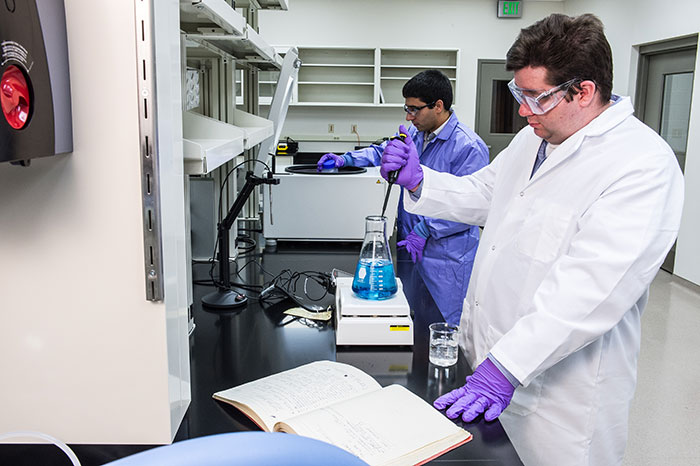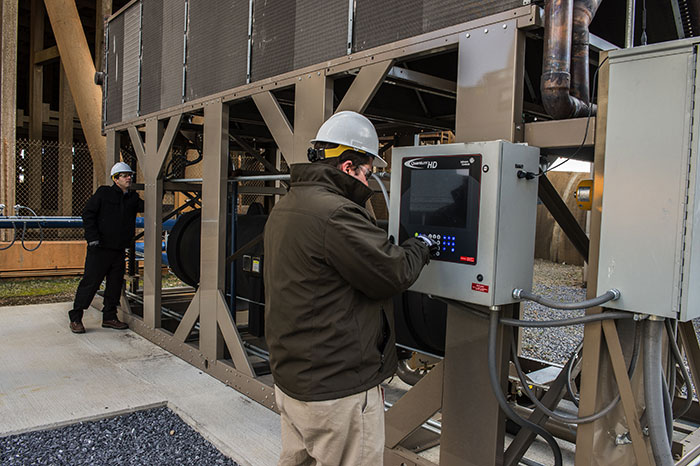As part of the Water Research Center (WRC) located at Plant Bowen we are focused on finding new technologies to reduce, conserve and improve the quality of water returned to the environment from our power plants.
Water Management & Conservation
In 2016, we withdrew on average approximately 600 million gallons of water per day from public waterways, but returned approximately 75% of that water back to Georgia's rivers. Because Georgia's water is a crucial part of keeping the lights on, we have a vested interest in using it wisely.
- We conserve water usage in plant operations by recycling and reusing water.
- We are updating facilities with more water-efficient plumbing (toilets, shower heads and sink faucets) or automated toilets and sinks.
Georgia Power recycles water we use for multiple purposes before returning it to the rivers. Water can be used to move ash throughout the system, provide dust control, and aid in some maintenance activities.
Research Focus Areas
The Water Research Center focuses on finding new ways to reduce, conserve and improve water quality for the power generation process in the following focus areas:
Moisture Recovery
Focuses on researching innovative technologies and methods to recover moisture that would otherwise be consumed or lost into the atmosphere through such processes as scrubber and cooling tower plumes and flue gas.
Zero Liquid Discharge
Explores technologies that separate pollutants into a solid material and a high-quality distillate. Waters created from these processes could be reused in the plant.
Cooling Tower & Advanced Cooling Systems
Explores ideas such as increasing cooling tower cycles of concentration, diversion/reduction of cooling tower heat loads, the feasibility and applicability of hybrid/dry cooling systems, wet surface air coolers, reducing parasitic load and the use of non-traditional water sources.
Wastewater Treatment
Focuses on technologies to treat water from various waste streams throughout the power plant such as floor drains and storm water runoff that will allow the use of these waters in various processes within the plant.
Solid Landfill Water Management
Explores water issues related to managing on-site landfills with the addition of new solids such as zero-liquid-discharge salts and sludges to existing landfills containing bottom ash, fly ash and gypsum.
Carbon Technology Water Issues
Develops models to determine the impacts of retrofitting various post-combustion carbon capture technologies to the use of water at the plant site, reducing the impact of CO2 capture on plant water use.
Water Modeling, Monitoring & Best Management Practices
Results from each of the focus areas are used to model strategies for managing water balances and to explore tools for evaluating overall water use (baseline and real time), process and wastewater rerouting, reuse/recycling and conservation/recovery methods and impacts. The Best Practices focus area will develop a standard procedure for formulating, evaluating and selecting power plant water management options based on reliable technical and economic analyses. The end result will enable quick and accurate assessments of water uses throughout an electric power generation facility, identification of conservation, recycle and/or reuse options, and evaluation of the impacts of such options on plant makeup water needs, process water chemistry and wastewater treatment requirements.

Water Research Center
See how the research is conducted...

Adjusting the pH levels
Front: An engineer adjusts the pH of a solution.
Back: An engineer operates a centrifuge used for mixing another solution.

Thermosyphon Pilot Unit
An engineer adjusts the controls on the Thermosyphon Pilot Unit.
Expand your water research knowledge with these resources and partner links
Water Research Brochure (PDF)
Plant Bowen Fun Water Facts (PDF)
American Electric Power
Arizona Public Service
The Babcock and Wilcox Company
DTE Energy
Duke Energy
Edison International
Electric Power Research Institute
First Energy
Great River Energy
Hoosier Energy
Oglethorpe Power
PowerSouth Energy Cooperative
Southern Research Institute
SRP

